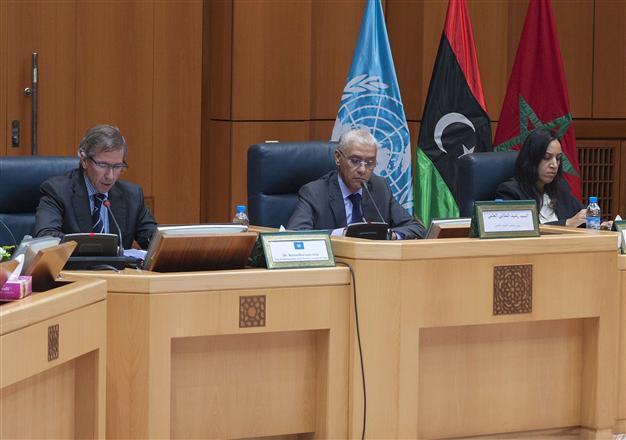UN Special Envoy to Libya Bernardino Leon (L), Moroccan Minister for General and Economic Affairs Rachid Talbi Alami (C) and Moroccan Minister of Foreigns Affairs Mbarka Bouaida (R) participate in the UN-brokered talks in Skhirat, near the Moroccan capital Rabat on June 9, 2015. AFP Photo
Libya's warring factions began crunch talks June 8 as world leaders called for "bold political decisions" to prevent the oil-rich nation crumbling into a failed state.
Amid warnings that chaos in Libya has allowed the Islamic State of Iraq and the Levant (ISIL) to make inroads on Europe's doorstep, United Nations envoy Bernardino Leon is pushing for an agreement before the start of the Muslim holy month of Ramadan on June 17.
"The timing for fighting has passed, the moment for bold political decisions has come," G7 leaders said in a closing statement after a summit in Germany.
"Libyan leaders must now grasp the opportunity to conclude these negotiations and form a Government of National Accord accountable to the Libyan people."
Libya descended into chaos after a 2011 NATO-backed uprising toppled and killed veteran dictator Moamer Kadhafi, with heavily armed former rebels carving out fiefdoms across the country.
Jihadist groups have exploited the lawlessness, which has also prompted a huge influx of migrants trying to make the dangerous crossing to Europe, with shipwrecks leaving hundreds dead and the European Union straining to respond.
Three previous rounds of peace negotiations between Libya's rival parliaments and governments have failed to reach an accord.
"Today, the eyes of the people of Libya all on you," UN envoy Leon told the parties at the outset of the talks June 8 in the Moroccan seaside resort town of Skhirat, saying they had the power to "bring an end to the suffering of the Libyan people".
"Recent terrorist and other attacks from groups in the country should serve as a wake up call... The fighting must end," the Spanish diplomat urged.
The talks are discussing a new draft of a political agreement to end the conflict, the UN mission to Libya, UNSMIL, said June 12.
Leon said he hoped to receive the delegations' responses to the new proposals as quickly as possible.
"Early next week we will try to meet again," he said.
Representatives of the rival parliaments will travel to Berlin on June 9 to meet with senior officials from the Group of Seven countries, according to sources close to the negotiations.
"UNSMIL is of the firm conviction that this round will be decisive," the UN mission said.
Pressure has been mounting for a deal, with Algeria, Egypt and Italy on Sunday calling for a political agreement.
At a meeting of top diplomats hosted by Cairo, the three countries backed Leon's efforts, with Italian Foreign Minister Paolo Gentiloni saying Libya was "at a very important juncture".
He called for the rivals to "quickly find a solution that satisfies everyone," adding that an agreement was crucial not only for peace on the ground but to "control people smuggling and illegal migration" from Libya to Europe.
At negotiations last week in Algiers, Leon warned that Libya was "at the limit". With oil production stalled, institutions are running out of UN money to pay salaries and cover expenses, he said.
During April talks in Morocco, he and other negotiators said the sides were very close to an agreement on a draft proposal to form a national unity government that would serve for a maximum of two years.
After last week's two days of talks in Algeria, Libyan political factions called for the urgent formation of government so it can "swiftly assume its responsibilities to tackle the many difficult challenges facing Libya."
The G7 said it would "provide significant support" to help a new government rebuild infrastructure, including restoring public services and strengthening the economy.
Last week, Libyan factions expressed concern about the "upsurge in terrorist acts" and the "imminent danger" from the takeover by ISIL of some territory.
The jihadist group, which controls swathes of Syria and Iraq, has won the loyalty of several Islamist groups in Libya and claimed responsibility for a series of attacks and atrocities, including the killings of dozens of Egyptian and Ethiopian Christians.
